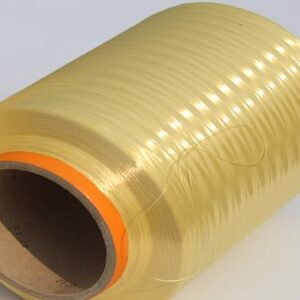When it comes to choosing the right sewing thread for high-strength applications, UHMWPE sewing thread stands out as one of the best options available. Ultra High Molecular Weight Polyethylene (UHMWPE) is a fiber known for its exceptional strength, durability, and resistance to wear. This article will explore how it compares to regular threads, highlighting the advantages it offers for specialized sewing projects and its increasing popularity in various industries.
1. What is UHMWPE Sewing Thread?
UHMWPE sewing thread is made from Ultra High Molecular Weight Polyethylene fibers, which are renowned for their strength-to-weight ratio. These fibers are created by polymerizing polyethylene molecules in such a way that they form extremely long chains. The result is a fiber that is much stronger than steel while remaining light and flexible. This thread is commonly used in industries where high-performance materials are required, such as in aerospace, military, and marine applications.
2. Strength Comparison: UHMWPE vs. Regular Sewing Threads
When compared to regular threads like cotton, polyester, or nylon, UHMWPE sewing thread is significantly stronger. The primary differences in strength can be explained by the molecular structure of the fibers:
- Tensile Strength: UHMWPE fibers are often cited as having a tensile strength that is up to 15 times greater than steel on a per-weight basis. This means that for the same weight, UHMWPE thread can hold far more tension before breaking.
- Durability: Regular sewing threads such as cotton and polyester wear down much faster when exposed to friction, UV rays, and harsh conditions. UHMWPE thread, on the other hand, is highly resistant to abrasion and environmental wear, making it ideal for long-term use in extreme conditions.
- Weight: Despite its incredible strength, UHMWPE sewing thread is lightweight, allowing for comfortable and easy handling without compromising on strength. In contrast, regular threads tend to be heavier for similar strength, leading to bulkier and less efficient sewing solutions.
3. Advantages of UHMWPE Sewing Thread Over Regular Threads
a) Superior Abrasion Resistance
One of the standout features of UHMWPE sewing thread is its ability to resist abrasion. This makes it perfect for use in applications where regular threads might break down, such as in the manufacture of outdoor gear, sports equipment, and protective clothing. The durability of UHMWPE ensures that the stitching remains intact even under heavy wear and tear.
b) UV and Chemical Resistance
Unlike many regular threads, which degrade under UV light or in the presence of harsh chemicals, UHMWPE sewing thread is highly resistant to these environmental factors. This makes it a reliable choice for products that will be exposed to sunlight or chemical substances, such as marine ropes, tents, or military gear.
c) Lightweight Yet Strong
While regular threads can offer decent strength, they often add unnecessary weight to a product. UHMWPE thread, however, maintains high tensile strength while being remarkably lightweight. This is especially beneficial in applications where weight is a critical factor, such as in aerospace or outdoor adventure gear.
d) Flexibility and Ease of Use
Despite its strength, it remains flexible and easy to work with. This means it can be used in a variety of sewing machines without the risk of snapping or damaging the fabric. Regular threads like cotton or polyester may require special consideration for use with heavy-duty materials, whereas UHMWPE is versatile across a wide range of applications.
4. Where to Find High-Quality UHMWPE Sewing Thread?
If you’re looking to purchase UHMWPE sewing thread, you can find reliable suppliers and manufacturers in the market. It is important to select a reputable UHMWPE sewing thread factory to ensure you receive high-quality, durable products. A trustworthy supplier will provide a wide range of UHMWPE threads, tailored to your specific needs, whether for industrial, military, or outdoor applications.UHMWPE sewing thread suppliers typically offer custom solutions, depending on the strength, length, and application requirements. Be sure to inquire about the source of their materials, their manufacturing process, and any certifications or quality assurance guarantees they offer. This ensures you are investing in a product that will perform reliably over time.
5. Applications of UHMWPE Sewing Thread
- Outdoor Equipment: Due to its resistance to UV damage and abrasion, Manufacturers commonly use UHMWPE thread in the production of tents, backpacks, and sleeping bags.
- Sports Gear: High-performance sports equipment, including shoes, protective gear, and ropes, often utilizes UHMWPE thread for its durability and strength.
- Aerospace and Military: Manufacturers use UHMWPE in parachutes, bulletproof vests, and other gear where high strength and low weight are crucial.
- Marine: Ropes, sails, and other marine products benefit from the enhanced strength and resistance to water damage provided by UHMWPE thread.
6. Why Choose UHMWPE Sewing Thread for Your Next Project?
If your project requires high-strength, durable, and lightweight materials, it is the ideal choice. Whether you are manufacturing heavy-duty outdoor gear, high-performance apparel, or industrial products, this thread can offer enhanced durability, reduced wear and tear, and superior performance compared to regular threads. By choosing a reliable UHMWPE sewing thread supplier, you can ensure that your products will stand the test of time, even under the most demanding conditions.
FAQ – Frequently Asked Questions
1. What makes UHMWPE sewing thread stronger than regular threads?
UHMWPE fibers have extremely long polymer chains, giving them a higher tensile strength than traditional fibers like polyester, cotton, or nylon.
2. Can UHMWPE sewing thread be used in any sewing machine?
Yes, it is generally compatible with most standard sewing machines. However, it is advisable to check the machine’s specifications and use the appropriate needle to ensure smooth sewing.
3. Is UHMWPE thread resistant to UV and chemicals?
Yes,it is highly resistant to both UV radiation and chemicals, making it ideal for outdoor gear, marine applications, and industrial uses where regular threads may degrade quickly.




